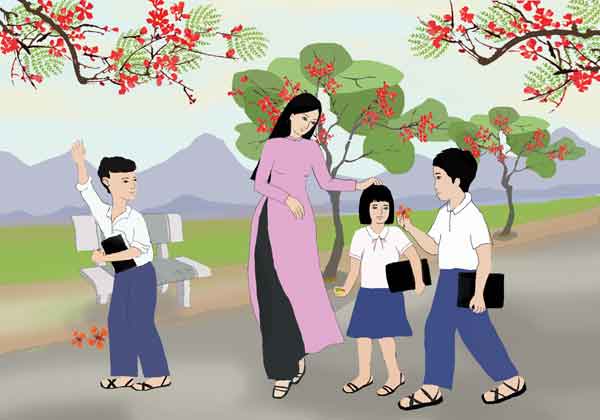Tôi Đi Học – nguyên tác by Vietnamese
https://thuhoa.ipower.com/BaiViet/ToiDiHoc-TT.doc
- audio book
(English translation by Nguyễn Đại Thanh)
Every year at the end of autumn, yellow leaves scatter on roads, and white clouds float in the air. I am very excited by sweet recollections of my first school day.
I cannot forget those great feelings that flourish in my heart like fresh flowers smiling under a clear sky. Those memories have not yet been penned because I did not know how to write then, and now I cannot totally recall them all. But whenever I see small children timidly nestle under their mothers’ conical hats for their first time to school, I feel very much inspired again.
That morning full of autumn fog and cold wind, my mother affectionately held my hand going down the narrow and long village road. I had traveled this road many times; however, this time I found it unexpectedly strange. My surroundings had changed because there was a transformation happening within myself: I was going to school for the first time. I did not wade across the river to fly kites like Quy and go with Son to fool around in the field anymore. In a long and black robe made of parachute cloth, I felt formal and serious.
Along the way, I enviously observed some well-dressed little boys about my age cheerfully call one another by nicknames and exchange their books and notebooks. My two new books began to weigh heavier in my hand. I clutched them tightly, but one became loose, pointing downward. I pushed it back and carefully gripped them. Some students in front of me carried many books and notebooks under their arms together with pens and rulers, but they did not show any difficulties at all.
I wanted to check my strength so I looked at my mother and asked, “Please hand the pens and rulers to me.” My mother lowered her head and looked back at me with her affectionate eyes and said, “Son, I can hold them all.” Immediately I had this childish and naïve thought: Only an adept person could hold pens and rulers. That idea passed quickly through my mind as lightly as a cloud flying across a mountain peak.
The front courtyard of My Ly School was overcrowded with people. Everyone had a neat and clean appearance; their faces brightened with joy. A few days ago when going across Hoa An Village to trap birds with Minh, I had stopped by the school. That time the school had been an unknown place to me. I had gone around the classrooms to take a peek at some maps hanging on the wall through the glass windows. To me, the school had been higher and cleaner than the houses in the village. But this time was quite different. Before me, the school looked both charming and imposing as the village hall of Hoa An. Its courtyard appeared larger and its building higher than they were on completely still summer noons. I suddenly felt anxious without reason.
Like me, some other new students, bewildered, stood close to their relatives, only daring to glance quickly at others or stepping lightly. They resembled young birds standing on the rim of the nest, looking out onto open space, wanting to fly, yet hesitating with trepidation. They quietly wished they could have been the older students who knew their classrooms and teachers to avoid being timid in this unknown world.
After a rolling of the drum resounded in my heart, some old students came lining up under the veranda roof and stepped into their classroom. I felt abandoned at this time because all around were awkward and confused little boys like me. They did not move. They only yielded when pulled forward by force. Truthfully, they did not stop because their two feet kept dragging. They each raised one foot and forcefully extended them as if kicking an imaginary ball. Right at this moment, their whole bodies were shaking in sync with resonant steps in the classrooms.
The principal of My Ly School called in some new students to stand up in front of the third grade classroom. The village school was small; therefore, the principal did not have his own office. While he was calling roll, I felt my heart skip a beat. I even forgot my mother standing behind me. When my name was called, I was startled and puzzled.
After calling a few dozen names written in advance on a large piece of paper, the principal looked at us and said in a low voice, “So here you are in the fifth grade. You have to try to study to please your parents and make your teacher happy. Do you hear me?” They did hear, but none dared to respond. Luckily, there was a sonorous answer “yes” from the parents in return.
The principal looked at us with his benevolent and affecting eyes. Some third grade students also turned their heads together to look out, and a few people outside stopped to look inside from the road. During this minute, we were scrutinized. As a result, already embarrassed, we were increasingly puzzled.
The principal took off his glasses and said, “Line up here to enter your classroom.” I felt a hand tenderly pushing me forward from behind, but my body became unusually heavy. Unable to hold the end of a dress or the arm of a relative, a few students slowly stepped up and stood on the veranda of the class. They stared out towards the school yard where their relatives were watching them with loving eyes. One student standing at the head of the line hid his face in his hands and cried. I unknowingly turned back and followed suit, burying my face into my mother’s chest. I heard soft sobbing that halted in the throats of the new students behind me. A familiar hand gently smoothed my hair.
The principal patiently and smilingly waited for us and said, “Do not cry. You will go home at noon and you will have the day off tomorrow.” After examining the twenty-eight students lined up straight on the school veranda, he made a gesture to let us enter the fifth grade.* A young teacher with a smiling face welcomed us at the class entrance. Throughout my childhood I had never spent a significantly long time away from my mother. I also found it strange because many past times I had spent a whole day with my friends in the field of Le Xa Village, and I still had not felt far away from home or my mother at all.
A peculiar scent filled the classroom. All the pictures hanging on the walls were extraordinary and interesting to me. I carefully examined my desk and chair and claimed them as my own property. I looked at a little boy sitting beside me, a new friend, yet seemingly familiar. Our bond felt natural and so unexpected that I could not believe it.
A young bird came hovering and perched on the window, chirped timidly and then took off with a flap of its wings. I cast a longing glance at the bird. An old memory of trapping birds in the middle of the rice field and by the Viem riverbank fully relived in my mind; however, the sound of my teacher scratching chalk on the blackboard brought me back to reality. I folded my arms on the table, watched attentively as my teacher wrote, and mumbled the writing assignment “I go to school.”
= = = = = = = = = =
*According to the Vietnamese educational system prior to 1945, the fifth grade was the lowest level in elementary schools. It was the equivalent to the first grade in American schools.
Tập-San Việt-Học • Viện Việt-Học • 15355 Brookhurst St., Suite 222, Westminster, CA 92683, USA • Tel: 714-775-2050 • Email: info@viethoc.com












